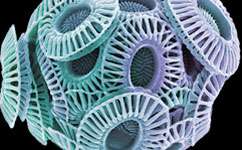Scientists sound acid alarm for plankton

The microscopic organisms on which almost all life in the oceans depends could be even more vulnerable to increasingly acidic waters than scientists realised, according to a new study.
Previous experiments have given an unduly optimistic view of the impact of acidifying oceans on plankton; it turns out that the methods used may have biased their results.
"Plankton often grow in clumps or aggregates," says Professor Kevin Flynn of Swansea University, lead author of the study. "But the way they are handled tends to break these clumps up. When a scientists starts working on a plankton sample in the lab, the first thing they do is give it a good shake."
How acidity affects microbes depends greatly on the size of the aggregate they're in, so studying plankton whose intricate communities have been disrupted doesn't give an accurate picture of the conditions they will face in the wild.
To correct this distortion, UK and Australian researchers used computer simulations to examine the chemical environment immediately around the bodies of plankton in varying conditions. They found that if predictions of general ocean acidification come true, many kinds of plankton will face much more acidic conditions, and more widely varying conditions over each day, than previously realized – conditions far beyond anything seen in recent history. The results are likely to be stunted growth, or even death.
Ocean acidification (OA) is happening as the carbon dioxide we release into the atmosphere dissolves in seawater to form a weak acid. Scientists predict that by the end of the century, the oceans' average pH level will drop by 0.3 units - the lower the value, the more acidic. This doesn't sound like a big change, but it equates to a doubling in acidity. Many organisms may struggle to deal with such changes, particularly those that grow external skeletons out of calcium carbonate, which can dissolve in acid conditions.
Everything from crustaceans and corals to microscopic algae could be at risk; this study focused on the key drivers of the planktonic community. These are among the most important living things on Earth; they form the base of the ocean food pyramid, turning sunlight into nourishment for grazing animals and ultimately predators.
The photosynthetic algae absorb CO2 through photosynthesis; when they die, their bodies sink to the seabed where much of the carbon they absorbed in life is stored for long periods. Some of this material now exists as chalk; much of it was converted to oil and gas which we now extract and burn. This means these organisms form a vital part of the global carbon cycle.
Flynn explains that understanding the effects of OA on particular living things is much more complex than it might seem. Even apart from the effects of their tendency to group together, the metabolic processes of very small marine organisms can have a serious effect on the conditions close to them. This means these organisms don't simply face the conditions found in seawater at a large scale; they create their own microenvironment.
"Different types of plankton will experience different conditions depending on their sizes and metabolic rates," Flynn says. Living things that are photosynthesising absorb carbon dioxide from the water around them, making it less acidic; conversely those that are respiring absorb oxygen and emit CO2, increasing the ambient acidity.
The results suggest that ocean acidification could change the mix of plankton living in the oceans, with species that can't deal with changed conditions losing out to those that can. Calcifying plankton are likely to be among the hardest-hit, because the chemical processes involved in forming their chalky shells themselves contribute to making their immediate surroundings more acidic. In another twist, as seawater gets more acidic, its capacity to protect against even more acidity diminishes, so general ocean acidification will increase the impact of the local acidification that plankton trigger.
But Flynn says OA's impact will be complex. While calcifying plankton are alive, it's possible they may be able to stave off too much damage to their shells; a more important consideration for the wider environment is what happens after they die. If their skeletons dissolve instead of sinking to the seabed and being locked up in sediments, then there are important implications for the carbon cycle. But all this assumes that conditions under OA allow them to grow in the first place, and this research indicates the difference in the acid micro-climate that calcifiers and non-calcifiers will endure.
The researchers now plan to turn their attention to other marine animals that may be at risk, including the early stages of fish and shellfish - these are microscopically tiny, forming part of the plankton, so are subject to similar small-scale environmental effects. Flynn is also leading a NERC-funded project in collaboration with the Department for the Environment, Food and Rural Affairs to investigate OA's impact on commercial fisheries.
The Natural Environment Research Council (NERC) provided the primary funding for the study, which appears in Nature Climate Change. Its authors included scientists from Plymouth Marine Laboratory, the Marine Biological Association and the universities of Swansea and Dundee in the UK, and from the University of Technology Sydney and Monash University, Victoria in Australia.
More information: Changes in pH at the exterior surface of plankton with ocean acidification, Kevin J. Flynn, et al. Nature Climate Change (2012) doi:10.1038/nclimate1489
Journal information: Nature Climate Change
Provided by PlanetEarth Online
This story is republished courtesy of Planet Earth online, a free, companion website to the award-winning magazine Planet Earth published and funded by the Natural Environment Research Council (NERC).



















